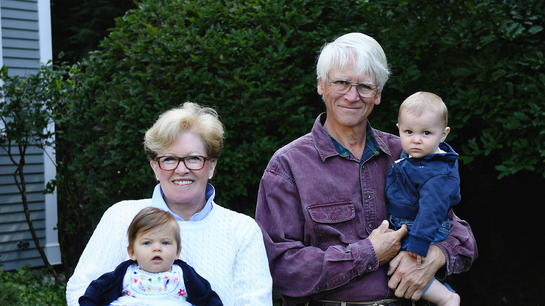The College Donor Digest
Intelligent College Giving: Sandy and Ginny MacNeil
March 27, 2020 | Emily Koons Jae

Virginia (Ginny) and Sandy MacNeil are the founding donors of the Tocqueville Program at Furman University. Originally designed as a course linked to an endowed lecture series, the program now also offers postdoctoral fellowships, a Friday afternoon political thought club, a society for undergraduate students, an academic residency program for first-year students, and assistance in placing Furman undergraduates in prestigious summer programs. FAR Director Emily Koons Jae recently interviewed the MacNeils about their experience founding the Tocqueville Program and watching it flourish.
What drew you to Furman University as the right place to start the Tocqueville Program?
Ginny: Neither of us went to Furman, though we live relatively close to the campus. We lived and worked in Wisconsin before retiring in North Carolina. At church, we met someone who works at Furman, and he connected us to two Furman professors, Ty Tessitore and Ben Storey. When we met with them, we found we had similar concerns about higher education and similar views on what could be done to make things better. We knew that we could trust these professors to carry out our shared vision for a program. Part of that trust came from knowing the character of the person who introduced us to them.
Sandy: Once we decided to start the program at Furman, we raised the initial investment from friends of ours in Wisconsin. They respected us personally and especially our involvement with higher education. Ginny’s background is in education. She worked in development for a small engineering college and then served on the board of regents at the University of Wisconsin. Our friends trusted our insight, and, after all, we’re helping students develop character and leadership. That’s easy for people to get behind.
There’s a great deal of talent in this country amongst individuals who can’t afford to go to college. On the other hand, there are people like us with a little more means who want to help higher education without just giving to the old alma mater. We also saw the opportunity to generate support for kids to get an education who otherwise wouldn’t have the means to go to college.
What inspired your gift, and what do you hope it achieves?
Sandy: Higher education has a problem, and it’s more than just a money problem. We were concerned about what wasn’t being done in higher education and decided to try to initiate some activity. Forming the Tocqueville Program gave people a chance to participate in that mission.
Education, particularly higher education, needs to have two sides to the story. Students need to hear a view and its opposing view in order to make their own decisions. We feel that bigger institutions are stifling this kind of dialogue.
Do you have any advice for people who are thinking about giving to higher education?
Sandy: The change in higher education is going to take place, not from the top down, but from the middle and bottom up. There are plenty of schools like Furman around the country where people like us can either contribute to an existing program or develop one. We find that larger institutions are not interested in what the average person has to say, so we are attracted to smaller colleges where a difference can still be made.
Practically speaking, we learned a great deal from Ginny’s background in education about how to structure the gift. You don’t give the money directly to the college. Instead, you identify individual professors within that institution, partner with them, and give the money to a foundation. The foundation can release funds upon request to these individual professors as needed, rather than the college.
What do you look for in the programs you support?
Sandy: We focus on leadership and character development. It’s good for students to know something about science and technology since that’s the way the country is going, but that direction could change in 10 or 20 years. Technical skills can become obsolete. But once an individual learns how to think and communicate, that transcends any changes that might take place in a culture.
The Tocqueville Program seems to have flourished at Furman. Did the growth of the program surprise you?
Ginny: This program has grown far beyond what we ever expected.
Sandy: Originally, we started this program as a course and lecture series for undergraduate students. Now, we have postdoctoral fellows who want to learn how to teach through the Tocqueville Fellows. Undergraduate students formed their own discussion groups as well as joined a political thought club. The students took the program and ran with it so that they could keep learning outside of the classroom. We also have a summer placement initiative that connects high-achieving students to internships and programs at places like the American Enterprise Institute, the Hertog Program, and ACTA.
What has been the most rewarding part of the Tocqueville Program?
Ginny: It’s been very rewarding to be involved with something that is so meaningful to many students, and they’ve just taken off with it. Students have started attending Furman because of the Tocqueville Program. In fact, I was sitting next to an older gentleman at a lecture. While we were waiting for the lecture to start, he turned to me and said, “My grandson decided to come to Furman because of the Tocqueville Program.” He had no idea who I was. Some of the mothers that also attended the lectures have said, “Thank you so much for starting this program.” And I just said, “Their success is our reward.” That’s really what it is.







